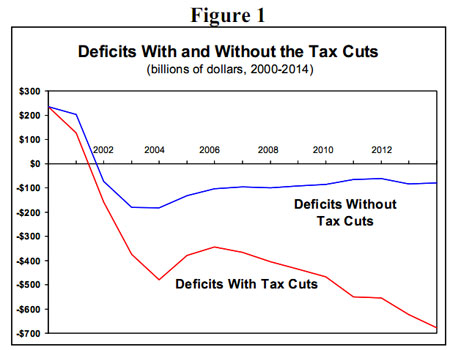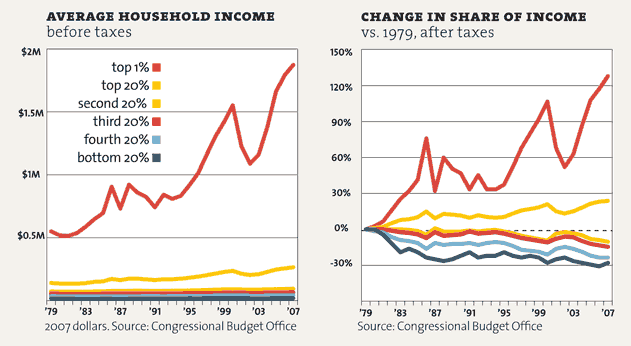Avorysuds
Gold Member

Tax cuts for the wealthy is OK if the country can afford them. When borrowing from foreign banks to fund them.....NOT SO MUCH!
This includes the expenditures associated with the two wars...one totally unnecessary
.................................Total U S Debt.......................................
09/30/2009 $11,909,829,003,511.75(80% Of All Debt Across 232 Years Borrowed By Reagan And Bushes)
09/30/2008 $10,024,724,896,912.49(Times Square Debt Clock Modified To Accommodate Tens of Trillions)
09/30/2007 $9,007,653,372,262.48
09/30/2006 $8,506,973,899,215.23
09/30/2005 $7,932,709,661,723.50
09/30/2004 $7,379,052,696,330.32
09/30/2003 $6,783,231,062,743.62(Second Bush Tax Cuts Enacted Using Reconciliation)
09/30/2002 $6,228,235,965,597.16
09/30/2001 $5,807,463,412,200.06(First Bush Tax Cuts Enacted Using Reconciliation)
09/30/2000 $5,674,178,209,886.86(Administration And Congress Arguing About How To Use Surplus)
09/30/1999 $5,656,270,901,615.43(First Surplus Generated...On Track To Pay Off Debt By 2012)
09/30/1998 $5,526,193,008,897.62
09/30/1997 $5,413,146,011,397.34
09/30/1996 $5,224,810,939,135.73
09/29/1995 $4,973,982,900,709.39
09/30/1994 $4,692,749,910,013.32
09/30/1993 $4,411,488,883,139.38 ( Debt Quadrupled By Reagan/Bush41)(President Clinton raised tax rates while he still had a Democrat congress)
09/30/1992 $4,064,620,655,521.66
09/30/1991 $3,665,303,351,697.03
09/28/1990 $3,233,313,451,777.25
09/29/1989 $2,857,430,960,187.32
09/30/1988 $2,602,337,712,041.16
09/30/1987 $2,350,276,890,953.00
09/30/1986 $2,125,302,616,658.42
09/30/1985 $1,823,103,000,000.00
09/30/1984 $1,572,266,000,000.00
09/30/1983 $1,377,210,000,000.00
09/30/1982 $1,142,034,000,000.00(Total Debt Passes $1 Trillion)((Reagan Slashed Tax Rates To Pre Depression Levels)
09/30/1981 $997,855,000,000.00

Between 1981 and 1992, the national debt held by the public quadrupled. The annual budget deficit grew to $290 billion in 1992, the largest ever, and was projected to grow to more than $455 billion by Fiscal Year (FY) 2000. As a result of the tough and sometimes unpopular choices made by President Clinton, and major deficit reduction legislation passed in 1993 and 1997, we have seen eight consecutive years of fiscal improvement for the first time in America's history.
- Largest Surplus Ever: The surplus in FY 2000 is $237 billion—the third consecutive surplus and the largest surplus ever.
- Largest Three-Year Debt Pay-Down Ever: Between 1998-2000, the publicly held debt was reduced by $363 billion—the largest three-year pay-down in American history. Under Presidents Reagan and Bush, the debt held by the public quadrupled. Under the Clinton-Gore budget, we are on track to pay off the entire publicly held debt on a net basis by 2009.
- Lower Federal Government Spending: After increasing under the previous two administrations, federal government spending as a share of the economy has been cut from 22.2 percent in 1992 to 18 percent in 2000—the lowest level since 1966.
- Reduced Interest Payments on the Debt: In 1993, the net interest payments on the debt held by the public were projected to grow to $348 billion in FY 2000. In 2000, interest payments on the debt were $125 billion lower than projected.
- Americans Benefit from Reduced Debt: Because of fiscal discipline and deficit and debt reduction, it is estimated that a family with a home mortgage of $100,000 might expect to save roughly $2,000 per year in mortgage payments, like a large tax cut.
- Double Digit Growth in Private Investment in Equipment and Software: Lower debt will help maintain strong economic growth and fuel private investments. With government no longer draining resources out of capital markets, private investment in equipment and software averaged 13.3 percent annual growth since 1993, compared to 4.7 percent during 1981 to 1992.
To Establish Fiscal Discipline, President Clinton:
- Enacted the 1993 Deficit Reduction Plan without a Single Republican Vote. Prior to 1993, the debate over fiscal policy often revolved around a false choice between public investment and deficit reduction. The 1993 deficit reduction plan showed that deficit and debt reductions could be accomplished in a progressive way by slashing the deficit in half and making important investments in our future, including education, health care, and science and technology research. The plan included more than $500 billion in deficit reduction. It also cut taxes for 15 million of the hardest-pressed Americans by expanding the Earned Income Tax Credit; created the Direct Student Loan Program; created the first nine Empowerment Zones and first 95 Enterprise Communities; and passed tax cuts for small businesses and research and development.
- Negotiated the Balanced Budget Agreement of 1997. In his 1997 State of the Union address, President Clinton announced his plan to balance the budget for the first time in 27 years. Later that year, he signed the Balanced Budget Act of 1997, a major bipartisan agreement to eliminate the national budget deficit, create the conditions for economic growth, and invest in the education and health of our people. It provided middle-class tax relief with a $500 per child tax credit and the Hope Scholarship and Lifetime Learning tax credits for college. It also created the Children's Health Insurance Program to serve up to 5 million children and made landmark investments in education initiatives including educational technology, charter schools, Head Start, and Pell Grants. Finally, it added 20 more Empowerment Zones and 20 more rural Enterprise Communities, included the President's plan to revitalize the District of Columbia, and continued welfare reform though $3 billion in new resources to move welfare recipients to private-sector jobs.
- Dedicated the Surplus to Save Social Security and Reduce the National Debt. In his 1998 and 1999 State of the Union addresses, President Clinton called on the nation to save the surplus until the solvency of Social Security is assured. He also repeatedly vetoed large Republican tax cut bills that would have jeopardized our nation's fiscal discipline. The President's actions led to a bipartisan consensus on saving the surplus and paying down the debt.
- Extended Medicare Solvency from 1999 to 2025. When President Clinton took office, Medicare was expected to become insolvent in 1999, then only six years away. The 1993 deficit reduction act dedicated some of the taxes paid by Social Security beneficiaries to the Medicare Trust Fund and extended the life of Medicare by three years to 2002. Thanks to additional provisions to combat waste, fraud and abuse and bipartisan cooperation in the 1997 balanced budget agreement, Medicare is now expected to remain solvent until 2025.
No defense to the giant welfare growing president that was Bush but shall I post the graphs given by the best economists on earth about what UE was supposed to be with the stimulus vs without... and then what it was?
Bush's tax cuts didn't cause the problems, it was the hundreds of billions he was spending on new Government welfare programs, including military.



